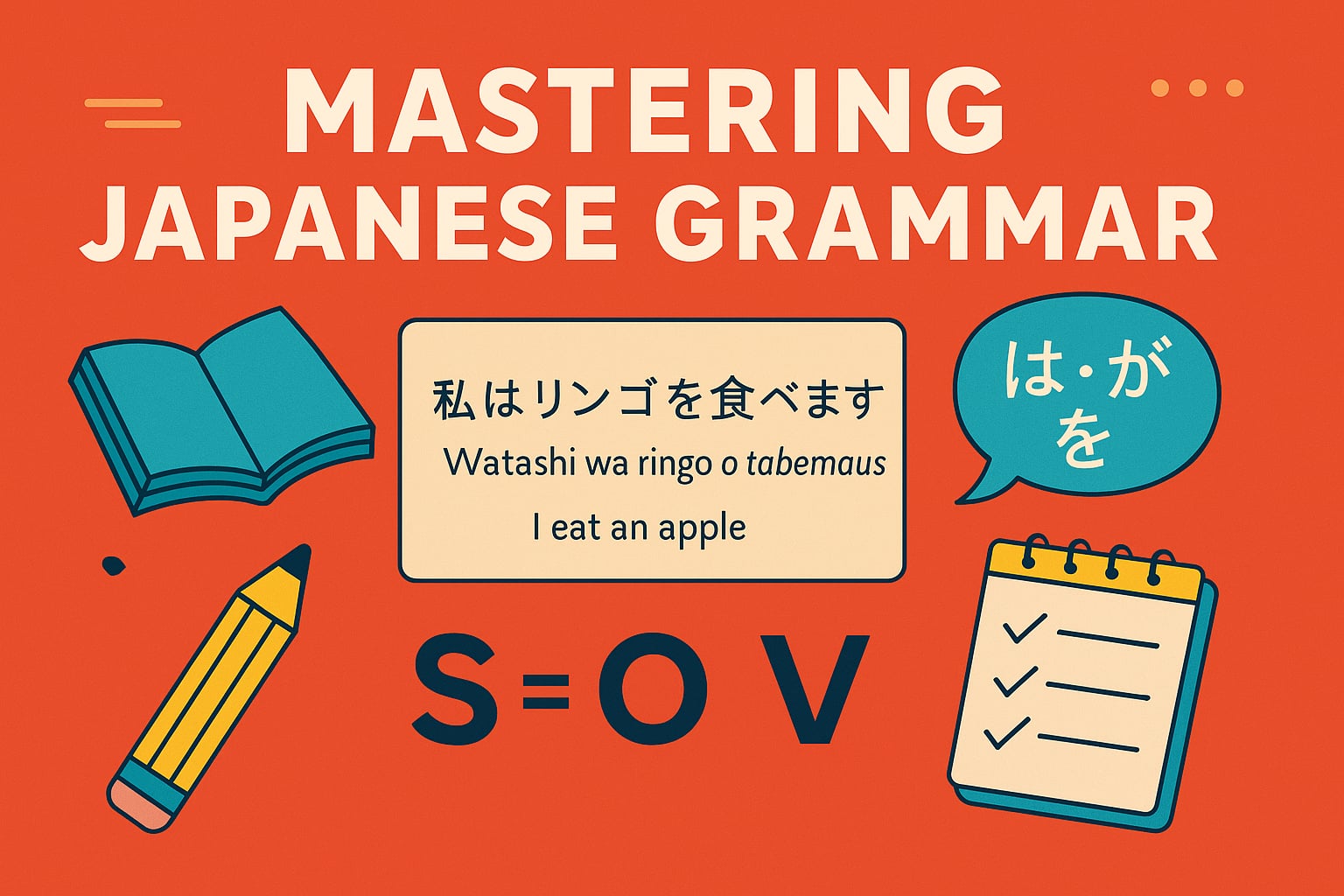Introduction
Why is Mastering Japanese Grammar Important?
Japanese grammar serves as the backbone of the language, determining how words interact in sentences. Understanding grammar is crucial for:
- Creating correct sentence structures
- Using particles effectively (が, を, に, で, etc.)
- Conjugating verbs correctly
- Expressing yourself naturally and confidently in Japanese
Mastering grammar gives you the tools to understand and produce sentences in a way that native speakers will easily comprehend.
Best Strategies to Master Japanese Grammar
1️⃣ Start with the Basics: Sentence Structure
In Japanese, the basic sentence structure follows the Subject-Object-Verb (SOV) pattern. This is different from English, where the structure is Subject-Verb-Object (SVO). For example:
- English: “I eat an apple.”
- Japanese: “私はリンゴを食べます” (Watashi wa ringo o tabemasu) – “I apple eat.”
Understanding this basic structure is the first step in mastering Japanese grammar.
2️⃣ Focus on Particles
Particles are small words used to indicate the role of a word in a sentence. Key particles include:
- **は (wa)**: Topic marker
- **が (ga)**: Subject marker
- **を (o)**: Object marker
- **に (ni)**: Direction or time marker
- **で (de)**: Location or means marker
These particles are essential for creating correct sentences, so focus on learning their usage and distinctions.
3️⃣ Master Verb Conjugation
Verb conjugation in Japanese is more straightforward than in many other languages. Verbs are categorized into Group 1, Group 2, and Irregular Verbs. The key conjugation patterns include:
- Present/Future: 食べる (taberu) – to eat
- Past: 食べた (tabeta) – ate
- Negative: 食べない (tabenai) – don’t eat
- Te-form: 食べて (tabete) – eat and…
Learning verb conjugation is crucial for expressing actions, states, and desires in different tenses and moods.
4️⃣ Learn Grammar Through Context
Grammar points can often be confusing when learned in isolation. It’s important to learn grammar through real examples and context. This helps you see how grammar is used naturally in conversations, books, TV shows, or manga. Some excellent resources for this include:
- Genki I and II – Great for beginners and intermediate learners
- Tae Kim’s Guide to Japanese Grammar – A comprehensive guide
- NHK News Web Easy – News in simple Japanese for context-based learning
5️⃣ Practice Speaking and Writing
The best way to internalize grammar is to use it regularly. Try speaking with native speakers or writing short essays to practice new grammar points. Language exchange platforms like HelloTalk and Tandem are excellent places to find conversation partners.
Common Grammar Mistakes to Avoid
- Mixing up particles: It’s easy to confuse particles like **は** and **が**, or **に** and **で**. Be mindful of their distinct roles.
- Overusing polite form: While the polite form (**ます**/**です**) is essential, don’t neglect the casual form when talking with friends or in informal settings.
- Forgetting verb conjugations: Always pay attention to verb forms and tenses. Japanese verbs change according to formality, tense, and context.
Tips for Retaining Grammar Knowledge
- Consistent Practice: Regularly review and use grammar points in conversations or writing.
- Use SRS (Spaced Repetition Systems): Apps like Anki help you remember grammar points through spaced repetition.
- Break Down Complex Sentences: Start with simple sentences, then gradually increase complexity as you become more confident.
Recommended Resources for Learning Japanese Grammar
- JapanesePod101: Offers audio and video lessons focusing on grammar usage.
- BunPro: An online platform that teaches grammar points in a systematic way, similar to SRS.
- WaniKani: While primarily for Kanji, WaniKani’s review system is useful for remembering grammar.
- Tofugu: A well-organized resource for grammar explanations with cultural insights.
Conclusion
Mastering Japanese grammar may seem challenging at first, but with consistent practice and the right resources, you will see significant improvement. By focusing on sentence structure, particles, verb conjugation, and learning through context, you’ll be able to use grammar confidently and naturally. Keep practicing, and soon you’ll be able to speak and write in Japanese with ease!
Ready to master Japanese grammar? Start today and take your language skills to the next level!

